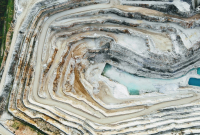Support strong Canadian climate journalism for 2025
The federal government announced a new registry to track plastic production to set the tone as negotiations on a Global Plastics Treaty kick off on April 23 in Ottawa.
“The Federal Plastics Registry is a practical tool that will help track plastics across the economy, inform future actions, and measure progress to reduce plastic waste and pollution,” said Environment and Climate Change Minister Steven Guilbeault in the press release announcing the registry. It will compel plastic producers to monitor and track plastic over its life cycle.
The NDP and advocacy groups have called for the registry as a necessary first step to address plastic pollution. However, the Liberals need to do more to hold companies accountable, said NDP MP Gord Johns in an emailed statement to Canada’s National Observer.
The NDP wants to see the federal government cap plastic production and end federal subsidies to fossil fuel and petrochemical companies, said Johns.
“We really need to stop thinking recycling is the way forward,” said Pui Yi Wong of the Basel Action Network in Malaysia at a press conference organized by the federal NDP on April 22.
“Plastic recycling is contributing to plastic pollution,” she said, displaying photos of facilities burning plastic waste and dumps in Malaysia.
“When you send your plastic waste to Malaysia for recycling, you're essentially polluting our soil, our water, our air and our bodies, as well as our life.”
Canada still has not ratified an article of the Basel Convention that prohibits countries from exporting hazardous wastes to developing countries, and ships a majority of waste to the U.S., which has a well-documented track record of sending plastic waste to poor, developing countries.
Johns’ crafted a motion that calls on the government to negotiate a Global Plastics Treaty that reduces global plastic production and closes these export loopholes.
Less than 10 per cent of plastics in Canada are recycled, according to Environment and Climate Change Canada. The rest ends up in landfills and all throughout the land and waters.
Greenpeace and other groups want the treaty to establish a target to reduce plastic production by at least 75 per cent below 2019 levels by 2040.
“We're realizing that plastic is not really an inherently circular material. It's different than metals, it's different than paper. We have to stop production,” said Jim Puckett, executive director and founder of Basel Action Network.
While the negotiations take place, the Conservative Party will be trying to roll back some of the measures the federal government has taken to rein in plastic pollution.
Conservative MP Corey Tochor introduced a private member’s bill to repeal a section of the Canadian Environmental Protection Act that designates “plastic manufactured items” as toxic. This designation is important because the federal government is allowed to regulate toxic products. Tochor’s bill is currently being debated for the first time in the House of Commons.
“Banning plastic is bad for people's health. It is bad for their pocketbooks, and it is bad, actually, for the environment,” said Tochor in the House of Commons on April 18. “The science shows that plastic is not toxic.”
Plastic pollution has well-documented impacts on human and environmental health. Microplastics accumulate in humans and animals, plastic waste causes air pollution when it is incinerated and greenhouse gas emissions are released into the atmosphere when plastic is created.
“We might reasonably wonder whether the Conservatives have ever read a scientific study on this. To be clear, I am talking about independent studies carried out somewhere other than the labs at Dow Chemical or Imperial Oil,” said Bloc Québécois MP Monique Pauzé in French during the debate on Tochor’s bill.
It “embodies the official Opposition's denial of environmental issues” and years of scientific research, said Pauzé, criticizing the Conservatives for “acting as the political valet of the oil and petrochemical lobby,” which led a successful court challenge against the single-use plastics ban.
Tochor said 95 per cent of plastic pollution that ends up in the oceans comes from 10 rivers: eight in Asia and two in Africa.
“Banning more and more plastics in Canada will not stop this problem,” he said, adding the problem lies with developing countries that don’t have a waste management program. His comments did not address Canada’s plastic export practices.
Tochor also said the federal government should cancel the “radical international plastics banning meeting.”
At an April 22 press conference announcing the registry, Guilbeault highlighted other actions the government has taken, like helping to “launch the ocean plastics charter during Canada's 2018 G7 presidency” and the domestic ban on harmful single-use plastics implemented in 2021. The single-use plastics ban was deemed unconstitutional by a Federal Court judge but while the federal government is appealing the decision, the ban will remain in place. The Bloc Québécois supports the federal government’s choice to appeal the decision, said Pauzé.
The NDP pushed for a national strategy to tackle plastic pollution in 2018 when Johns tabled a motion (it passed) that called for a national strategy to combat plastic pollution. It included measures that have been adopted by the Liberal government, including a program that helps remove old fishing gear from the ocean. However, Johns noted that the Liberals’ have not reinstated funding for the program despite the importance of addressing “ghost gear.”
The Department of Fisheries and Oceans responded to a request for comment but did not answer whether or not the program’s funding will be reinstated.






Comments